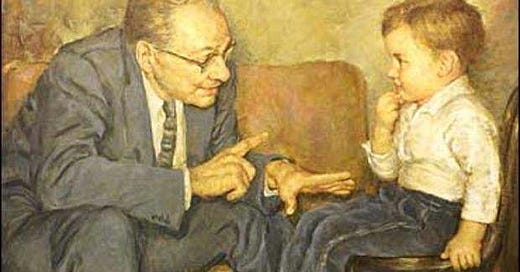The Monster Study was conducted in 1939 in Davenport Iowa. The lead scientist, Wendell Johnson of Iowa State University, along with his study assistant, Mary Tudor, that conducted the majority of the actual "work".
The Monster Study was conducted on twenty two orphaned children living at a veteran's orphanage. It was to establish a hypothesis regarding the origins of stuttering. Johnson was trying to induce stuttering into the speech of healthy children.
Ten of the children chosen had already been marked by teachers as stutterers. Of those ten five were separated off into the good group, and five into the poor group. Tudor and five other graduate students who agreed to serve as judges listened to each of the children speak, graded them on a scale from 1 (poor) to 5 (fluent) and concurred with the school's assessment. Five were assigned to Group IA, the experimental set, and would be told that their speech was fine. The five in Group IB, the control group, would be told that their speech is "as bad as people say"
The remaining twelve children aged five to twelve were chosen at random from the regularly fluent general population. They were also subdivided. Group IIA were told that they were showing the beginnings of stuttering and they must address it immediately. IIB were told that they had excellent speech and enunciation.
The experiment lasted from January to late May of 1939 and the actual interaction with the children was forty five minutes with Mary Tudor every few weeks. She followed a previously agreed upon script when it came to these interactions. In her dissertation written on the study she said that to the stuttering kids that were to be treated as though their stuttering was not concerning, she said in part;
"You'll outgrow [the stuttering], and you will be able to speak even much better than you are speaking now. . . . Pay no attention to what others say about your speaking ability for undoubtedly they do not realize that this is only a phase."
For those that did not stutter but were to be told otherwise she said;
"The staff has come to the conclusion that you have a great deal of trouble with your speech. . . . You have many of the symptoms of a child who is beginning to stutter. You must try to stop yourself immediately. Use your will power. . . . Do anything to keep from stuttering. . . . Don't ever speak unless you can do it right. You see how [the name of a child in the institution who stuttered severely] stutters, don't you? Well, he undoubtedly started this very same way."
The children that were branded as stutters had a profound and rapid response. Most stopped speaking all together for fear of criticism and humiliation. When they did speak there was no confidence, though just weeks earlier they were bright, happy, well spoken children. Their schoolwork suffered dramatic setbacks. One of the twelve year old girls became difficult, and combative She rarely spoke and when asked if she had told her best friend about her stuttering she replied that she hadn't. "Why not?" She was asked. "I hardly ever talk to her," she responded. Two years later she ran away from the orphanage and ended up in a reform school.
Mary Tudor was not blind to the significant impact on the children. Even after the experiment she would travel to the orphanage attempting to undo the damage. She repeatedly told the induced stutterers that they did not stutter at all. It had no effect to reverse the extreme anxiety the children experienced in daily living, and the effect on their confidence in speaking.
As many people that find this study reprehensible, there are still people that support it and its methods. They feel that the damage done was outweighed by the information gleaned by destroying the children's belief in themselves and the lasting effects that never left some of them.
I think that these types of experiments are conducted because there is a lack of insight and foresight as to the impact on the study subjects. In the Monster Study none of the children were informed that they were the part of an experiment. The secrecy of this experiment was probably kept so it would not affect the outcome of the study. In the other experiments I would guess that the reasoning was similar.
Is it ever worth it? The Monster Study has its supporters in the scientific community.
The University of Iowa publicly apologized for the Monster Study in 2001. However, Patricia Zebrowski, University of Iowa assistant professor of speech pathology and audiology notes that the data that resulted from the experiment is the "largest collection of scientific information" on the phenomenon of stuttering and that Johnson's work was the first to discuss the importance of the stutterer's thought's, attitudes, beliefs, and feelings, and continues to largely influence views on stuttering.




Grotesque. Some things don't need to be proven by studies and legitimately are just part of accumulated human wisdom. That repeatedly telling children negative things about themselves will get you that result should have been in that category.
Man those poor kids. To me this illustrates the importance of being kind. Thank you for another very well written, informative article.